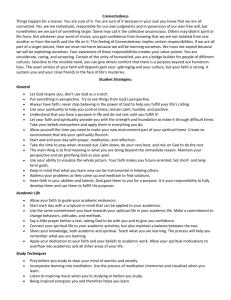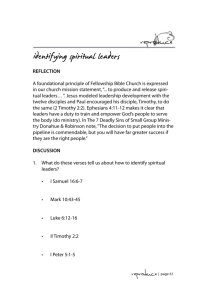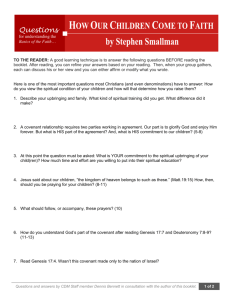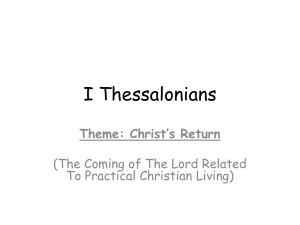A Spiritual History Tool: FACT - Association of Professional Chaplains
advertisement
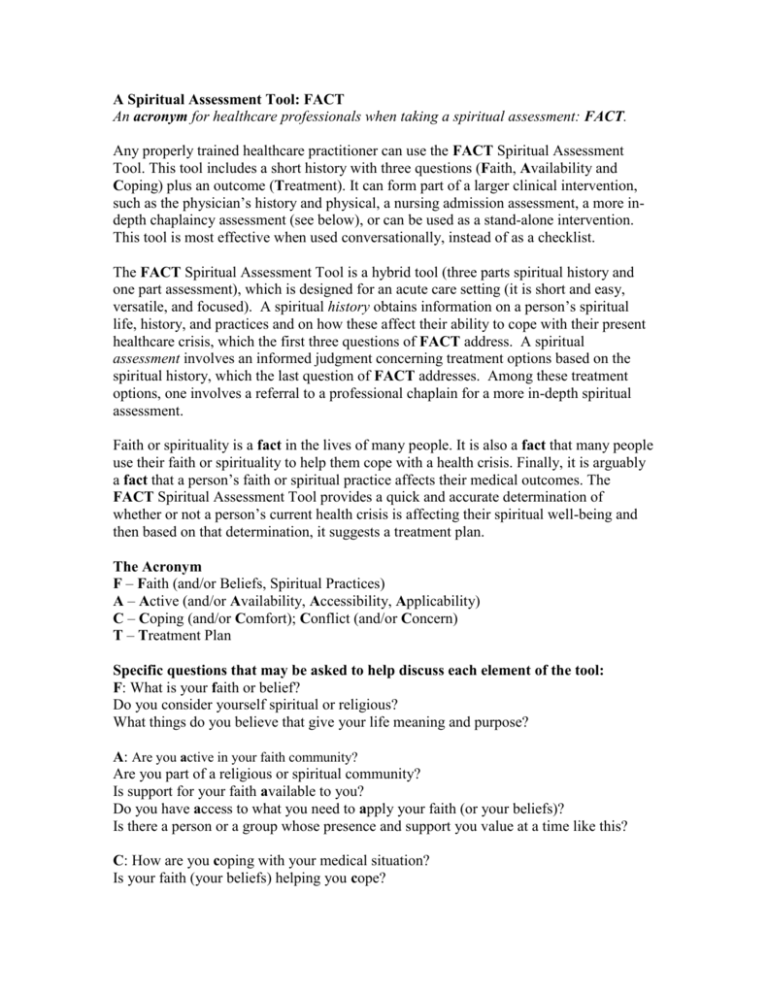
A Spiritual Assessment Tool: FACT An acronym for healthcare professionals when taking a spiritual assessment: FACT. Any properly trained healthcare practitioner can use the FACT Spiritual Assessment Tool. This tool includes a short history with three questions (Faith, Availability and Coping) plus an outcome (Treatment). It can form part of a larger clinical intervention, such as the physician’s history and physical, a nursing admission assessment, a more indepth chaplaincy assessment (see below), or can be used as a stand-alone intervention. This tool is most effective when used conversationally, instead of as a checklist. The FACT Spiritual Assessment Tool is a hybrid tool (three parts spiritual history and one part assessment), which is designed for an acute care setting (it is short and easy, versatile, and focused). A spiritual history obtains information on a person’s spiritual life, history, and practices and on how these affect their ability to cope with their present healthcare crisis, which the first three questions of FACT address. A spiritual assessment involves an informed judgment concerning treatment options based on the spiritual history, which the last question of FACT addresses. Among these treatment options, one involves a referral to a professional chaplain for a more in-depth spiritual assessment. Faith or spirituality is a fact in the lives of many people. It is also a fact that many people use their faith or spirituality to help them cope with a health crisis. Finally, it is arguably a fact that a person’s faith or spiritual practice affects their medical outcomes. The FACT Spiritual Assessment Tool provides a quick and accurate determination of whether or not a person’s current health crisis is affecting their spiritual well-being and then based on that determination, it suggests a treatment plan. The Acronym F – Faith (and/or Beliefs, Spiritual Practices) A – Active (and/or Availability, Accessibility, Applicability) C – Coping (and/or Comfort); Conflict (and/or Concern) T – Treatment Plan Specific questions that may be asked to help discuss each element of the tool: F: What is your faith or belief? Do you consider yourself spiritual or religious? What things do you believe that give your life meaning and purpose? A: Are you active in your faith community? Are you part of a religious or spiritual community? Is support for your faith available to you? Do you have access to what you need to apply your faith (or your beliefs)? Is there a person or a group whose presence and support you value at a time like this? C: How are you coping with your medical situation? Is your faith (your beliefs) helping you cope? How is your faith (your beliefs) providing comfort in light of your diagnosis? Do any of your religious beliefs or spiritual practices Conflict with medical treatment? Are there any particular Concerns you have for us as your medical team? T: Treatment Plan 1. Patient is coping well a. Support and encourage b. Reassess at a later date 2. Patient is coping poorly a. Depending on relationship and similarity in faith/beliefs, provide direct intervention: spiritual counseling, prayer, Sacred Scripture, etc. b. Encourage patient to address these concerns with their own faith leader c. Make a referral to the hospital chaplain (Do not ask if the patient wants a referral—let the chaplain do his or her own assessment.) General guidelines to remember when using FACT: 1. Faith is already a FACT affecting the lives and healthcare choices for many patients and most already utilize faith-based practices as complementary treatment modalities: healthcare professionals need to assess how it impacts their treatment choices. 2. A spiritual assessment is less about what a person believes and more about how their faith or belief functions as a coping mechanism. 3. Respect the privacy of patients with regard to their spirituality; do not impose your own beliefs. 4. Make referrals to professional chaplains, spiritual counselors, and community resources as appropriate. 5. Your own spirituality can positively affect the clinician-patient relationship. Remember: Cure sometimes; relieve often; comfort always.‖ Addressing spiritual concerns with your patients can provide comfort. In itself, it is a therapeutic intervention. c 2007 Mark LaRocca-Pitts PhD BCC
